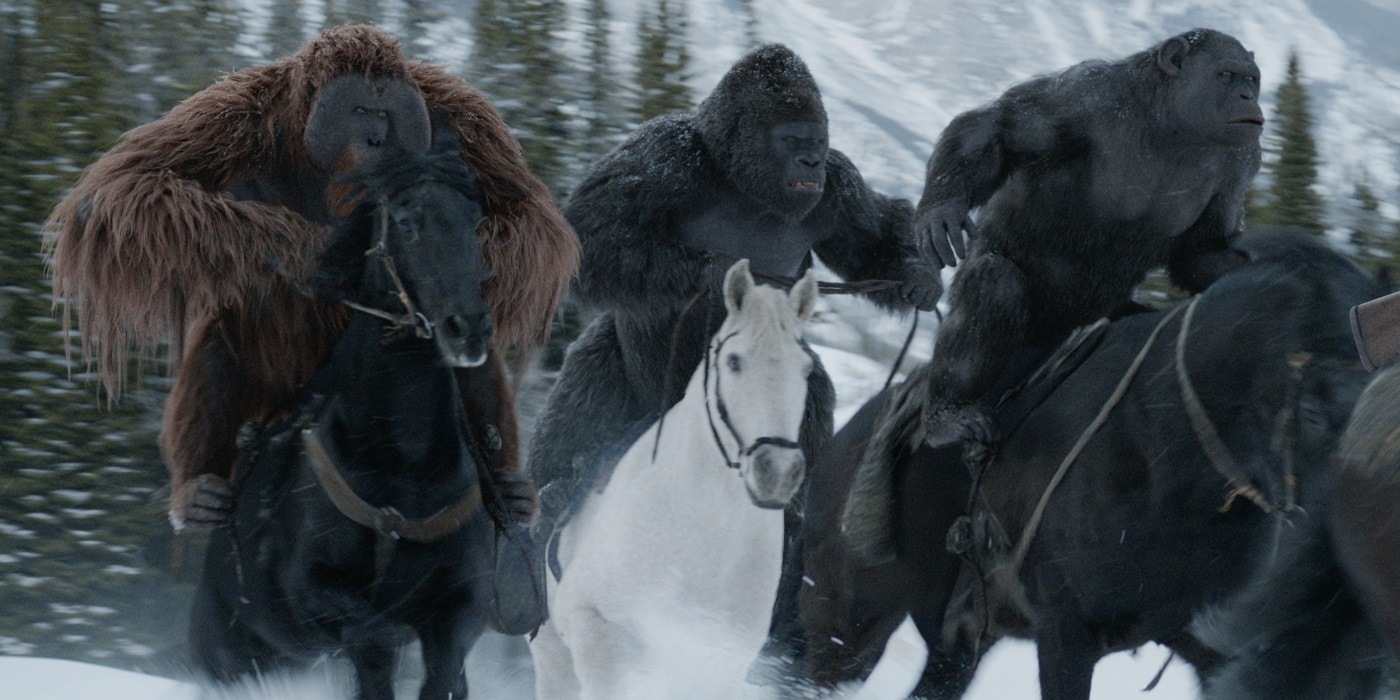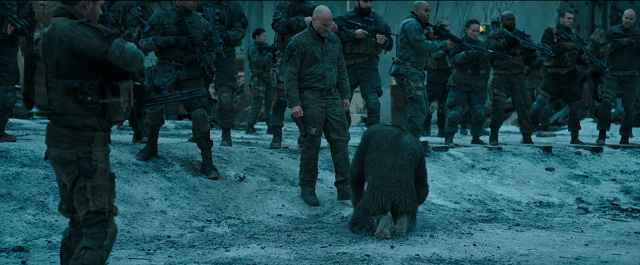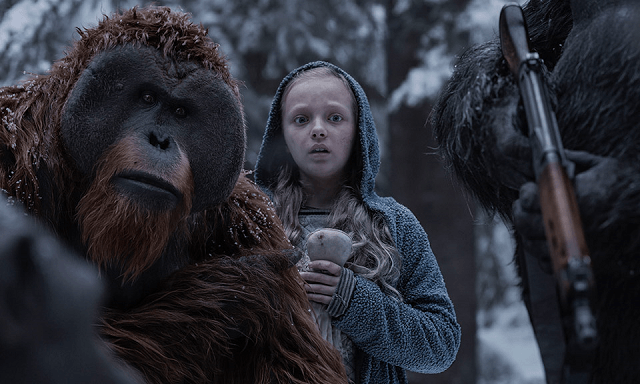“Ah, you think darkness is your ally.” So begins an iconic phrase from The Dark Knight Rises, spoken by Bane, an abstract of the underlying theme that runs through the series: darkness. In this, the third of the renewed Planet of the Apes series, a prequel to the 1968 original – a series of which there are five – the film stands out with its own theme, one that fills the space of each moment, an absence viewers may notice as strange before being able to put a finger on it. Silence. For a war film, War for the Planet of the Apes shines best in its silence, its moments of audible peace within the actual chaos of the scenes, lending itself to tension, fear, sadness, and a bevy of the other emotions that come with the agony of war.
The plot within the series of prequels seems straightforward: humans and apes go to war. A war which humans inevitably lose, giving way to a planet where apes rule and humans live in servitude. The actual plot, however, is a little different in that it is half revenge-movie and half prison-break, with the fall of humanity as a backdrop more than a main narrative. Within and outside of that narrative is the same theme though – that of survival – and the exposition plays almost like a close game with several lead changes, a back-and-forth struggle as humans and apes gain and relinquish power. It happens more than you might expect; it happened even more than I realized until reflecting on the film.
From the opening scene, humans assault an ape stronghold in a vicious battle that leaves 63 apes dead. Humans 1, apes 0. The apes rally in what is one of the few war-like scenes in a film with the word in its title; the apes battle back, and as the battle tide changes we see humans retreat, terrified, captured, and eventually pleading for their lives. Humans 1, apes 1. Caesar – the leader of the apes and protagonist of our 3 sequel films – sends the captives back to their base with a message, don’t start none, won’t be none, and his show of mercy sets the stage for another theme that runs throughout the film. You root for the apes. In a game with a dozen lead changes you consistently cheer against humanity.
And while it appears humans are entirely irredeemable to start, War for the Planet of the Apes adds a notable exception to add nuance in the form of a young girl. She is an orphan, made mute by the same simian flu that is pushing humans towards extinction, and is protected by the apes in what becomes a trademark display of mercy and high-mindedness from the primates. The little girl highlights several themes within the movie, good and bad. Supporting the apes’ side, there is a scene where she saves the moment and signs, in a moment of desperate emotion in a way only a child can, asking if she is a brave ape. I shuddered at the pause, fearing Maurice – the ape who served as her closest caretaker – was left to respond in the affirmative, that this little girl can earn a pass to abandon the human race and claim theirs, but the film sticks the scene by Maurice calling her something else altogether, denying her ape status but allowing her the pride of her decisions.
On the other hand, though, the little girl stands out for another reason: she is the only human girl or woman in the film with a speaking role (specifically through signing, which does, and should always, be counted). Of women apes who have speaking roles there are few and minor, and one could imagine it would not have taken much to include a woman ape in Ceasar’s circle, so the absence of women in a non-damsel role is a striking shortcoming of the film.
There is essentially one human with a speaking role though, played by Woody Harrelson who begins as a one-dimensional villain, representative of the worst of humanity, but who proves to be something more beneath his surface. His villainy is compelling in that while he is consistently deplorable, there is a level of depth and conviction to him that is honestly unexpected. It would have been easy and understandable to write the leader of a rebel army as power hungry, hate-filled, and thinly motivated by fear of inferiority to the “other,” but instead he represents evil motivated by survival – an honest, innate motivation that makes his evil debatable, if not understandable.
As War for the Planet of the Apes comes to a close in its final lead changes, Caesar is portrayed as much an action movie hero as he is a leader and intellectual, throwing grenades and running through explosions in the third act of the film. It is the balance of the two that make this Planet of the Apes series as interesting as it has been fun, with its honest look at humanity and the moral questions it begs while veiled in revenge plots and prison breaks. You cannot help but root for Caesar as much as you cannot shake the feeling that in the gamut of life and evolution humans may not deserve to be saved, and within the war between humans and apes you have plenty of silent moments to contemplate just if, or why, that is.
Are you following Black Nerd Problems on Twitter, Facebook, Tumblr or Google+?






Show Comments